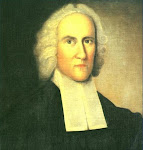Jesus Christ in John 17:26 makes the stunning announcement that the love which God has eternally enjoyed within himself is the same love that he has poured into the hearts of Christians. From all eternity past, within the one God, the Father has loved the Son and the Spirit with a steadfast, infinite, perfect love; the Son has love the Father and the Spirit with a steadfast, infinite, perfect love; and the Spirit has loved the Father with a steadfast, infinite, perfect love (John 3:35; 5:20; 14:31; 15:9; 17:23, 26). Jesus proclaims in John 17:26 that it is this same steadfast, infinite, and perfect love that God pours into the hearts of Christians when he makes us his children in Jesus Christ. To be sure, we will not love perfectly in this world, because sin blocks the full experience of God’s love in our hearts; however, because that love is vitally present in the hearts of Christians, we are able to begin truly to love the Lord our God with all our hearts (Deuteronomy 6:5) and to love our neighbors as ourselves (Leviticus 19:18).
Jonathan Edwards, the great 18th century American pastor, theologian, and revival leader, preached a sermon in the mid to late 1730’s on the work of this divine love in the hearts of Christians. Based on 1 John 4:16, the sermon bears the title “The Spirit of True Saints is a Spirit of Divine Love.” The sermon is typical of Edwards, a man in whose mind and heart the Lord brought together a surpassingly sharp intellect with deeply passionate love to God. Edwards lived and breathed and preached and wrote so that all people would know the majesty and beauty of God and would find the deepest longings of their souls quenched in God’s glory alone. The sermon on 1 John 4:16 is quite lengthy, so I want here to excerpt just a handful of quotes, along with a word of explanation concerning the context of each quote:
(The love of God in the heart of the Christian produces deep longing for the Lord.) “A true saint in his esteem exalts God above all. He is in his account the most excellent, the most glorious being. The saint esteems God so great and excellent as to be worthy of all that he requires. He accounts him worthy of all obedience, of all praise and glory. He accounts him worthy of the most humble addresses and worthy that he should give himself to him.”
(The love of God in the heart of the Christian produces esteem and honor for his or her neighbors.) “It is the tendency of this divine principle to honor natural men for that natural image of God that is in them and for their natural excellencies, their natural knowledge, wisdom, and the like. And to honor them for their outward dignities.”
(The love of God in the heart of the Christian produces a love for the attributes of God, even those attributes with which we as human beings sometimes struggle, like God’s sovereignty.) “But owning the sovereignty of God is what the saints take delight in. They see that God is worthy to be sovereign, that he is worthy to have the absolute domination over all creatures and disposes all things according to his own please and to make himself his end. A godly man can rest and be pleased in it. He loves to have God sovereign.”
(The love of God in the heart of the Christian produces a love for God for his own sake and not first for what the Lord does for us.) “True divine love is not so much because of the kindness that we have received of him as for himself, not so much for our sakes as for his own sake. . . . [A] true Christian loves God for himself because he sees him to be worthy of all love, not that he does and ought to love God for his benefits, but that this is not the only foundation of his love, but he loves him for his own excellency, for his own glorious nature whereby he esteems him worthy of the highest love.”
Jonathan Edwards, “The Spirit of the True Saints is a Spirit of Divine Love,” in The Glory and Honor of God: Previously Unpublished Sermons of Jonathan Edwards, vol. 2, Michael D. McMullen, ed. (Nashville, Tenn.: Broadman & Holman, 2004), 301-02, 320-21, 323.

No comments:
Post a Comment